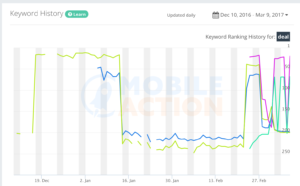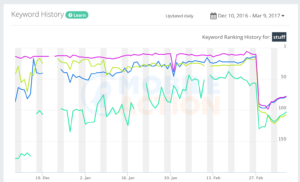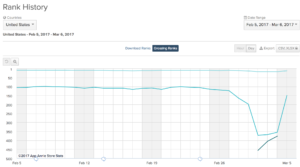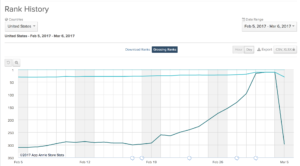Incipia blog
Google Ranking Algorithm Update – 2.27.17
Heads up! The Google Play ranking algorithm is now weighing user engagement and retention more heavily in Google Play rankings.
The Google Play Store team is rolling out a big ranking algorithm update, amongst a few other changes announced at the Google Play Developer Day via the 2017 Game Developers Conference. There were three major changes announced, with the major change affecting Google Play app store optimization listed first here:
- "Promoting high quality experiences based on engagement, not just installs:"
- "Offer sales and increase purchases of premium games with strikethrough pricing"
- More curation of high quality games through editorial pages:
Google's Android blog lists these additional details about this first point:
"With the enormous variety of games available on Google Play, there are many instances when great games don't get the visibility and attention they deserve. Recently, we've begun tuning our algorithms to optimize for user engagement, not just downloads. This is one of our ways to reward quality, which for games means promoting titles with stickiness (strong engagement and retention metrics) as well as a more traditional measure like a high star rating."
This update causes an immediate and significant impact, as it alters a long-held standard of the App Store ranking algorithm, which until now considered downloads and download velocity as by far the most important ranking signal. This standard incentivized app teams to focus on massive user acquisition, often favoring the acquisition of lower quality, low engagement level users over higher quality, high engagement level users, such as via a category boost campaign; simply put, lower quality users cost less and more could be bought with the same budget (sometimes for mere cents per download). Now, the incentive has adjusted, meaning that app teams will need to ensure their approach consists primarily of acquiring users that actually are "engaged" and "retained" within the app, rather than simply being concerned with acquiring a large total download volume.
Not only that, but Google is signaling that user ratings will be a more important factor in algorithm rankings, meaning that replying to user reviews and prompting users for reviews have suddenly increased in importance, from an already lofty level.
This change makes sense when considering Google's ongoing battle against spammers, and hopefully it will help to crack down on the success rate that spammers have enjoyed, especially as of late. Yet, spammers will ultimately find a way around these latest de-spamming efforts, possibly by adjusting their installs to reflect as "active" and via paid ratings.
Another move that Google should consider is putting more ranking weight towards an app's conversion rate/retention rate/ratings as sourced via an app's keywords or its featured placements as compared to peer apps, given it would divest the algrithm from its reliance on direct install data, which can be gamed more easily than organic (which Google controls). Finding other, innovative signals to base rankings off of, like Google's SEO page rank would also be a worthy investment. Analyzing purchase conversion rates could also be a way to fend off spammer influences by making it more expensive to game.
Confirming in
Here are two charts illustrating this algorithm update, the latter showing that Google's algorithm may still be confused with regard to some keywords.

In the wake of this change, here are some questions we're left with:
- The TechCrunch source article mentions "top charts," though Google's post doesn't specify; to what degree does this affect both ranking algorithms (category/country + keyword)?
- How does Google define "engagement" and "retention?"
- We do know that Google defines an active user as "The number of devices that have been active in the previous 30 days and on which the application is currently installed." But what other metrics may Google be looking at?
- Will Apple follow suit and adjust its ranking algorithm as well?
- Will Google soon provide benchmark data on user retention metrics, as it has with its store conversion rate benchmarks?
- 3/6/17 Update: Google's ranking algorithm update appears to have affected top grossing charts as well per the screenshots below.
The Bottom Line: An activation/retention strategy is more important than ever. Google's algorithm update means that, in order for Google Play ASOs to continue to succeed, they must either expand their remit to cover activation/retention or partner cross-team to better engage and retain users. ASOs should also consider more which keywords acquire active users, not just additional downloads by studying ranking trends as well as paid keyword acquisition data.
Categories
Tags:
- A/B testing
- adjust
- advertising
- adwords
- agile
- analytics
- android development
- app analytics
- app annie
- app development
- app marketing
- app promotion
- app review
- app store
- app store algorithm update
- app store optimization
- app store search ads
- appboy
- apple
- apple search ads
- appsee
- appsflyer
- apptamin
- apptweak
- aso
- aso tools
- attribution
- client management
- coming soon
- design
- development
- facebook ads
- firebase
- google play
- google play algorithm update
- google play aso
- google play console
- google play optimization
- google play store
- google play store aso
- google play store optimization
- google uac
- google universal campaigns
- idfa
- ios
- ios 11
- ios 11 aso
- ios 14
- ios development
- iot
- itunes connect
- limit ad tracking
- ltv
- mobiel marketing
- mobile action
- mobile analytics
- mobile marketing
- monetization
- mvp
- play store
- promoted iap
- promoted in app purchases
- push notifications
- SDKs
- search ads
- SEO
- skadnetwork
- splitmetrics
- startups
- swift
- tiktok
- uac
- universal app campaigns
- universal campaigns
- user retention
- ux
- ux design


